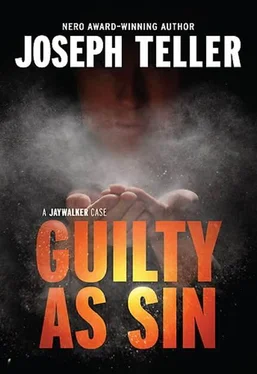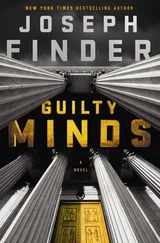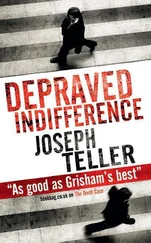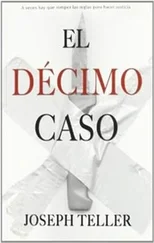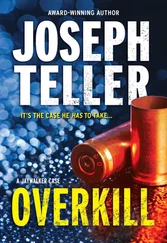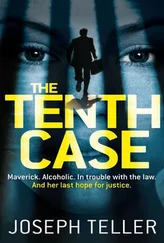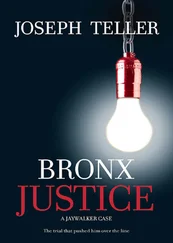Joseph Teller - Guilty As Sin
Здесь есть возможность читать онлайн «Joseph Teller - Guilty As Sin» весь текст электронной книги совершенно бесплатно (целиком полную версию без сокращений). В некоторых случаях можно слушать аудио, скачать через торрент в формате fb2 и присутствует краткое содержание. Жанр: Криминальный детектив, на английском языке. Описание произведения, (предисловие) а так же отзывы посетителей доступны на портале библиотеки ЛибКат.
- Название:Guilty As Sin
- Автор:
- Жанр:
- Год:неизвестен
- ISBN:нет данных
- Рейтинг книги:5 / 5. Голосов: 1
-
Избранное:Добавить в избранное
- Отзывы:
-
Ваша оценка:
- 100
- 1
- 2
- 3
- 4
- 5
Guilty As Sin: краткое содержание, описание и аннотация
Предлагаем к чтению аннотацию, описание, краткое содержание или предисловие (зависит от того, что написал сам автор книги «Guilty As Sin»). Если вы не нашли необходимую информацию о книге — напишите в комментариях, мы постараемся отыскать её.
Guilty As Sin — читать онлайн бесплатно полную книгу (весь текст) целиком
Ниже представлен текст книги, разбитый по страницам. Система сохранения места последней прочитанной страницы, позволяет с удобством читать онлайн бесплатно книгу «Guilty As Sin», без необходимости каждый раз заново искать на чём Вы остановились. Поставьте закладку, и сможете в любой момент перейти на страницу, на которой закончили чтение.
Интервал:
Закладка:
“Now,” she said, “who is Kenny Smith, and why are you calling him?”
Jaywalker stood, though he needn’t have. The jury was gone, and Shirley Levine wasn’t into formality. But Jaywalker worked better on his feet, especially when it was an uphill climb. “Kenny Smith is a private citizen,” he began. “A private citizen and convicted felon who happens to be a former client of mine.”
“Don’t tell me you lost a case.”
“It was a long time ago.”
“And what is Mr. Smith going to tell us?”
“He’s going to tell us things that, if believed by the jury, will lead them to conclude that Clarence Hightower is and continues to be a paid informer of law enforcement.”
Okay, it was a stretch. But at some point Sunday night it had occurred to Jaywalker that the uncle Hightower was getting weekly payments from might just be named Sam. As in Uncle Sam.
“What sort of things is Mr. Smith going to tell us?” the judge wanted to know.
“Among others, that Mr. Hightower was, at least until recently, receiving regular weekly cash payments from an undisclosed source. That he was given favorable treatment consistent with his being an informer on at least three separate occasions, first at the time of his arrest, later in court, and finally with the state parole authorities. And that when Mr. Smith attempted to serve a subpoena on him, Hightower responded by running away.”
“Suppose for a moment that you’re right about Mr. Hightower’s being an informer,” said the judge. “How is that relevant to this trial?”
“I can think of two reasons right off the bat,” said Jaywalker. “First, it means that the jury’s been deliberately lied to. Second, it means that Hightower is under the control of the prosecution. I want him brought here so I can call him as a defense witness. If the prosecution won’t do that, I want them sanctioned. I want a missing witness charge. And third, if Mr. Hightower was indeed an informer, my client has a legitimate entrapment defense.”
Jaywalker sat down. It was more than he’d wanted to say, but he was beginning to get angry-angry and frustrated. Those who knew him knew it could be a dangerous combination.
“Ms. Shaughnessey?” said the judge.
Miki Shaughnessey rose. “The issue isn’t whether or not Mr. Hightower has ever been an informer, or even if he is one now. So far as I know, he never has been and he isn’t now. But none of that matters. The issue is whether he was acting as an informer back in September of 1984, when he introduced Agent St. James to the defendant for the purpose of buying drugs. And the answer to that question is an unequivocal no. I even have a document, an official New York Police Department document that Mr. Jaywalker has seen with his own eyes, that makes that crystal clear.”
“Is that true, Mr. Jaywalker?”
“It’s true that I have seen such a document, and that the document says that no informer was utilized in this case.”
“So why,” asked the judge, “isn’t that the end of it? If he wasn’t an informer in this case, there can be no entrapment as a matter of law. Wouldn’t you have to agree, Mr. Jaywalker?”
“Yes,” Jaywalker was forced to concede.
“And Ms. Shaughnessey would therefore be right in wanting Mr. Smith’s testimony precluded. Right?”
“Right again.”
“So why isn’t that the end of the inquiry?”
“Ahhh,” said Jaywalker, back up on his feet. Here, finally, was the best part. The part that had kept him up most of the previous night, long after Kenny Smith had finished eating breakfast and left, long after Miki Shaughnessey had called back with word that Daniel Pulaski had refused to authorize the retesting of Hightower’s drugs. It was the part that had finally dawned on Jaywalker not too long before dawn itself had. The part that had prompted him to pick up the phone, call Kenny Smith and tell him to be in court at nine-thirty sharp that morning.
Lawyers are advocates, paid to argue positions. Those positions can be as lofty as a client’s factual innocence or as mundane as whether a particular witness should be addressed as Miss or Ms. Sometimes the position is supported by the facts, the law and the equities of the issue, and when those three considerations align, arguing is easy. But there are other times, times when a lawyer must- must -argue just as vigorously while standing on ground so shaky that it feels as though it’s going to give way any second. So fearful had Jaywalker been that his position on Clarence Hightower bordered on the frivolous that at one point Sunday night he’d thought about showing up in court Monday morning wearing hip boots and carrying a shovel.
And then the perfect, irrefutable argument had come to him. Perfect because it was absolutely bombproof. And irrefutable because it was dictated by nothing less than the United States Constitution.
“It’s not the end of the inquiry,” he now told the judge, “for the simple reason that for the life of me, I can’t remember my client ever requesting a trial in front of either the police commissioner or the district attorney. Nor, most respectfully, did he request a bench trial in front of Your Honor, though we did actually give that serious consideration. What my client requested was a trial by jury. And whether or not a particular individual was acting as an informer in a particular case becomes a question of fact. Nothing more, nothing less. As a result, the NYPD doesn’t get to decide that fact, not even by writing something on a piece of paper. Mr. Pulaski and Ms. Shaughnessey don’t get to decide that fact. Nor do I. Not even you get to decide that fact, Your Honor. The only ones who get to decide the facts in this case are those twelve people we just sent out of the room and down to the principal’s office.”
And the thing was, he was right. He knew it, Miki Shaughnessey knew it, and-most importantly-the judge knew it.
Not that Shaughnessey didn’t continue to contest the point. First she argued that the court had the discretion to preclude testimony that promised to be so vague as to be nothing short of speculative. Then she complained that permitting the testimony would force her to recall witnesses on rebuttal and perhaps even call additional ones, causing the trial to go on endlessly. Next she pointed out that she was being put in the impossible position of being forced to prove a negative. Finally she asked the judge to force Mr. Smith to testify first in the jury’s absence, to see if anything he had to say deserved to be heard by the jury.
“You’re suggesting an audition? ” was Jaywalker’s comment.
In the end, Shaughnessey’s objections were overruled one by one. The Constitution has a pretty neat way of ensuring that.
JAYWALKER: What do you do for a living, Mr. Smith?
SMITH: I press clothes in a dry cleaner’s, and I work for Mr. Jaywalker.
JAYWALKER: Have you ever been convicted of a crime?
SMITH: Oh, yeah, about fifteen of them. But none since I last got out of prison. So far it’s been eight years, two months and seven days. And it’s going to stay that way.
JAYWALKER: How long have you worked for me, Mr. Smith?
SMITH: Eight years, two months and seven days.
THE COURT: Listen carefully to the questions, Mr. Smith. He asked you a different one this time.
SMITH: I know, ma’am, but the answer is the same. The same day I got of prison, I goes to see Mr. Jaywalker. It was the first thing I did, before I even went home. He’d promised me when I went in that he’d have a job waiting for me if I came to see him, and he did as he said.
THE COURT: And did he have a job for you?
SMITH: He sure did. He made me his Official Unofficial Investigator. The unofficial part is on account of I’ve got a criminal record, so I can’t get a license or carry a gun or get paid by the state.
Читать дальшеИнтервал:
Закладка:
Похожие книги на «Guilty As Sin»
Представляем Вашему вниманию похожие книги на «Guilty As Sin» списком для выбора. Мы отобрали схожую по названию и смыслу литературу в надежде предоставить читателям больше вариантов отыскать новые, интересные, ещё непрочитанные произведения.
Обсуждение, отзывы о книге «Guilty As Sin» и просто собственные мнения читателей. Оставьте ваши комментарии, напишите, что Вы думаете о произведении, его смысле или главных героях. Укажите что конкретно понравилось, а что нет, и почему Вы так считаете.
